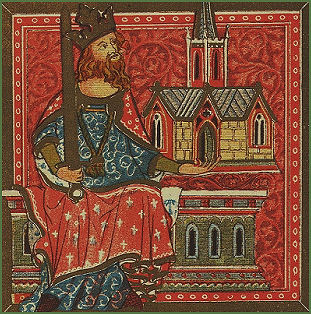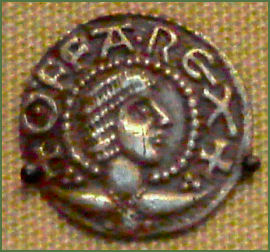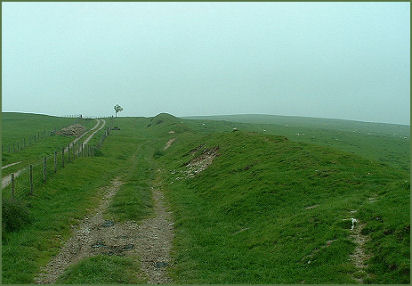Offa of Mercia
 Offa, an outstanding figure in Anglo-Saxon history, was the ruler of the tribal kingdom of Mercia from 757 to July 796.
Offa, an outstanding figure in Anglo-Saxon history, was the ruler of the tribal kingdom of Mercia from 757 to July 796.
Offa was the son of Thingfrith, son of Eanwulf, Eanwulf was the son of of Osmod, Osmod of Eowa (the brother of King Penda of Mercia). He married Cynethryth, who was to become the first Anglo-Saxon queen to be depicted on coinage, little is known about Cynefryth's parentage or origins. The couple produced one son, Ecgfrith, later King of Mercia, and four daughters, Æthelburh, in later life an abbess, Eadburh, who was married to Beorhtric of Wessex, Ælfflæd, wife of Æthelred I of Northumbria and Æthelswith.
He obtained the throne of Mercia in 757, during a period of civil war which followed the murder of his cousin, King Aethelbald, by the rival claimant Beornraed. In the early fouteen years of his reign he consolidated his control of the midland tribes, the Hwicce and the Magonsæte.
 Taking advantage of instability in the kingdom of Kent Offa established himself as overlord there. By 771, he had also gained control of Sussex. In the 780s Offa extended Mercian supremacy over most of the south of England, allying with Beorhtric of Wessex, who married Offa's daughter Eadburh. He also became the overlord of East Anglia, and had King Æthelberht II of East Anglia beheaded in 794, possibly for leading a rebellion against him. Offa proved to be a formidable ruler and is often regarded as the most powerful Anglo-Saxon king before Alfred the Great. He was a contemporary of the great Frankish king Charlemagne and sought to stand up to him as an equal.
Taking advantage of instability in the kingdom of Kent Offa established himself as overlord there. By 771, he had also gained control of Sussex. In the 780s Offa extended Mercian supremacy over most of the south of England, allying with Beorhtric of Wessex, who married Offa's daughter Eadburh. He also became the overlord of East Anglia, and had King Æthelberht II of East Anglia beheaded in 794, possibly for leading a rebellion against him. Offa proved to be a formidable ruler and is often regarded as the most powerful Anglo-Saxon king before Alfred the Great. He was a contemporary of the great Frankish king Charlemagne and sought to stand up to him as an equal.
Offa led campaigns against the Britons of Wales and as a result of these hostilities constructed Offa's Dyke, (pictured below left), for which he is possibly best remembered. The huge dyke marked the border between Wales and Mercia and is mentioned by the monk Asser in his biography of King Alfred the Great: "a certain vigorous king called Offa...had a great dyke built between Wales and Mercia from sea to sea"
 Forming the traditional boundary between England and Wales, the dyke was built during the 780's, the impressive earthwork runs, although not continuously, from the Dee estuary in the north to the river Wye in the south. In places, Offa's Dyke is up to 65 feet (19.8 metres) wide (including its flanking ditch) and 8 feet (2.4 m) high. Thousands of men were required to complete the earthwork and each section appears to have been built by people from a different district. The fact that this mammoth undertaking was achieved illustrates the cohesion of the Mercian kingdom under Offa. The dyke was never garrisoned but would have been manned by relatively small local forces
Forming the traditional boundary between England and Wales, the dyke was built during the 780's, the impressive earthwork runs, although not continuously, from the Dee estuary in the north to the river Wye in the south. In places, Offa's Dyke is up to 65 feet (19.8 metres) wide (including its flanking ditch) and 8 feet (2.4 m) high. Thousands of men were required to complete the earthwork and each section appears to have been built by people from a different district. The fact that this mammoth undertaking was achieved illustrates the cohesion of the Mercian kingdom under Offa. The dyke was never garrisoned but would have been manned by relatively small local forces
Offa built a palace at Tamworth so magnificent in style and furnishings, that it was declared to be ‘the wonder of the age’. He had links with Charlemagne, exchanging letters and gifts with the famous Frankish king and is bellieved to have established trading connections as far as Arabia.
Offa died on 29th July, 796 Roger of Wendover records “Offa, the magnificent king of the Mercians, having nearly completed his most noble monastery, died, according to the opinion of many, in the town of Offley (in Hertfordshire), and his body is said to have been conveyed to the town of Bedford, and to have been buried in a royal manner in a certain chapel outside the city, situated on the bank of the river Ouse. It is reported by nearly all the people of that neighbourhood, even to the present day, that the aforesaid chapel, from decay and the violence of that river, was precipitated, together with the king's tomb, into the stream; and that the sepulchre is now seen by bathers in the summer time deep beneath the waters, but though it has been sought with the greatest diligence, yet, as if by a fatality, it cannot be found.”
He was succeeded as King of Mercia by his son, Ecgfrith. Ecgfrith reigned for only 141 days, he was most likely killed by Offa's opponents.
Offa's Dyke image courtesy of Aloys5268
The Anglo-Saxon kingdom of Mercia
